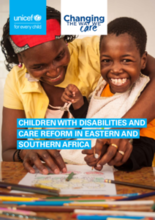This paper highlights the importance of placing support for children with disabilities and their families at the centre of care reform efforts, and provides examples from across the region of how this can be done.
This paper uses a social model of disability that defines persons with disabilities as those who have long-term physical, mental, intellectual or sensory impairments which, in interaction with various barriers, may hinder their full and effective participation in society on an equal basis with others. This way of understanding disability encourages policy makers and service providers to challenge the discrimination and social exclusion that leads to difficulty accessing services and can lead to separation. It motivates efforts aimed at the full integration of children with disabilities into families and communities.
This work requires both behaviour change and changes to policies, services and support.

